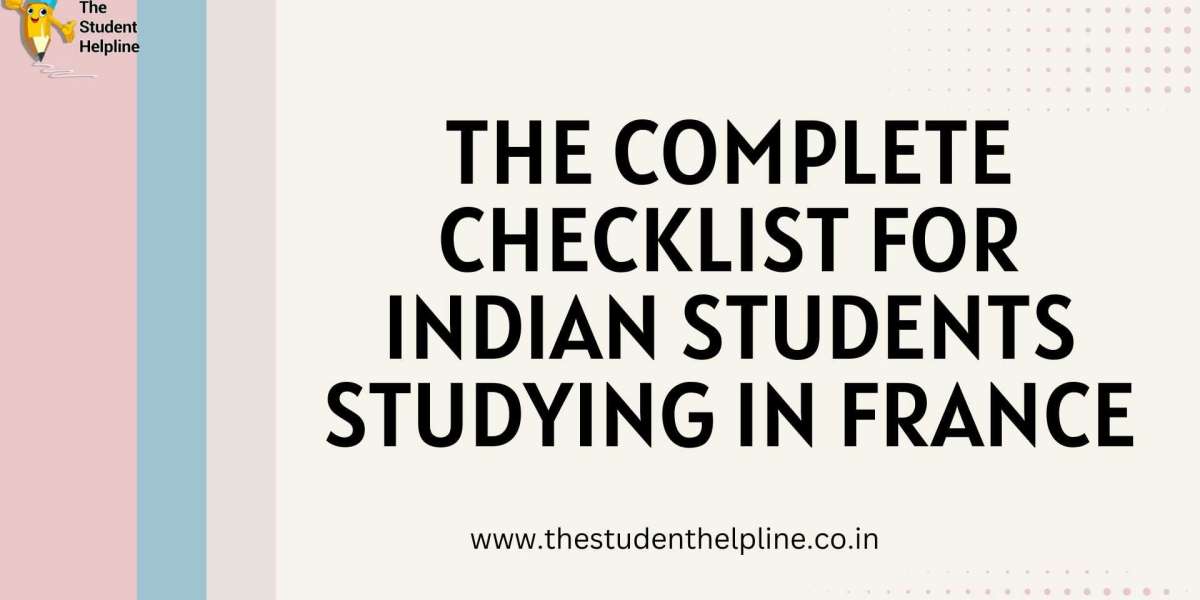Studying abroad, particularly in a country like France, offers an enriching experience filled with cultural immersion, quality education, and endless opportunities. However, preparing for this major step requires careful planning, from selecting the right university to securing a student visa, arranging accommodation, and more. For Indian students, navigating the various aspects of studying in France can be a bit overwhelming without the right guidance.
To help you stay on track, we’ve compiled The Complete Checklist for Indian Students Study in France. This guide will break down each step of the process, ensuring that you are well-prepared for your academic journey abroad. We also recommend working with The Student Helpline, a trusted consultant that specializes in helping students navigate the complexities of studying in France. Their expert assistance can make the entire process much smoother, from university applications to visa approvals.
1. Researching Universities and Programs in France
Identify Your Goals
Before diving into the process, it’s essential to identify your academic and career goals. What field of study are you interested in? What type of degree are you aiming for—bachelor’s, master’s, or PhD? Understanding your objectives will help you narrow down your university and program choices.
University Selection
France is home to some of the world’s most prestigious institutions, including Sorbonne University, HEC Paris, and Sciences Po. Each university has its strengths in specific fields such as business, engineering, arts, and humanities. With over 3,000 institutions to choose from, selecting the right one can be daunting. Here’s where The Student Helpline comes into play. Their experienced counselors can help you choose a university that aligns with your goals, academic performance, and career aspirations.
Language Requirements
While many programs in France are taught in English, certain institutions may require proof of French language proficiency. If you’re applying for a French-taught program, you’ll need to provide a DELF or DALF certification. For English-taught programs, IELTS or TOEFL scores are often required. The Student Helpline can assist you in understanding these requirements and help you prepare for the necessary language tests.
2. Preparing and Submitting Applications
Gather Required Documents
Once you’ve identified your preferred universities, the next step is to gather all the necessary documents for your application. These typically include:
- Academic transcripts and certificates
- Language proficiency test scores (IELTS/TOEFL/DELF/DALF)
- Statement of Purpose (SOP)
- Letters of Recommendation
- Curriculum Vitae (CV)
- Passport-sized photographs
- A valid passport
Each university may have specific requirements, so it’s crucial to double-check before submission. The Student Helpline provides end-to-end support with the application process, ensuring that your documents are in order and submitted on time.
Write a Strong SOP
Your Statement of Purpose (SOP) plays a crucial role in determining your admission. It gives the university insight into your background, interests, and why you’ve chosen their program. Writing a compelling SOP can be challenging, but The Student Helpline offers expert guidance to help you craft a personalized and impactful SOP that stands out.
Application Deadlines
French universities typically have two intakes—one in September/October (fall intake) and another in January/February (spring intake). Keeping track of application deadlines is vital to ensure you don’t miss out on your preferred program. The Student Helpline helps you stay on top of these deadlines and ensures that all documents are submitted within the stipulated time frame.
3. Securing Financial Aid and Scholarships
Explore Scholarship Opportunities
France offers various scholarship programs to international students, including those from India. Some popular scholarships include the Eiffel Excellence Scholarship, Charpak Scholarship, and École Normale Supérieure (ENS) International Selection. These scholarships can significantly reduce the financial burden of studying abroad.
Finding and applying for the right scholarship can be time-consuming and competitive. The Student Helpline can assist you in identifying suitable scholarships, guiding you through the application process, and helping you compile a strong scholarship application.
Budget Planning
Aside from scholarships, it's crucial to plan your budget. Tuition fees, accommodation, living expenses, travel, and health insurance are all factors to consider. France is relatively affordable compared to other European countries, but it’s still essential to plan and manage your finances effectively.
4. Applying for a French Student Visa
Visa Requirements
To study in France, you will need a long-term student visa (VLS-TS). The application process involves submitting the following documents:
- Acceptance letter from a French institution
- Proof of financial resources (approx. €615/month for the duration of your stay)
- Proof of accommodation in France
- Valid passport
- Health insurance proof
- Passport-sized photographs
Applying for a visa can be a complicated and tedious process, but The Student Helpline offers expert visa counseling services. Their team ensures that your application is completed accurately and guides you through every step, from preparing documents to booking your visa interview.
Book a Visa Appointment
Once your documents are ready, you need to book an appointment with your nearest French consulate or visa application center (VFS Global). Ensure that you apply for your visa at least three months before your planned departure date to avoid any delays.
5. Accommodation in France
Finding a Place to Live
Finding suitable accommodation is one of the most important tasks for international students. Options include university dormitories, private apartments, and shared accommodation. On-campus housing is usually more affordable and convenient, but spaces are limited.
The Student Helpline provides support in securing accommodation in France. They can assist you in finding safe and affordable housing options that suit your preferences and budget, whether it’s on-campus or private accommodation.
Apply for CAF
As a student in France, you may be eligible for CAF (Caisse d'Allocations Familiales), which offers housing subsidies to international students. Applying for CAF can help reduce your rental costs significantly. The Student Helpline can guide you through the application process for this benefit.
6. Health Insurance and Medical Coverage
Student Health Insurance
Health insurance is mandatory for all international students studying in France. If you are under 28, you will be enrolled in the French social security system for free upon arrival. However, you may also need to purchase additional private health insurance, depending on your specific needs.
The Student Helpline can help you navigate the French healthcare system and ensure that you have adequate coverage during your stay.
7. Pre-Departure Essentials
Book Your Flight
Once you’ve secured your visa and accommodation, it’s time to book your flight to France. Ensure that you book your tickets early to get the best rates. The Student Helpline can also provide recommendations for reliable travel agencies and flight options.
Packing List
When packing for your trip, remember to take into account the weather in France, which varies by region. Here’s a quick packing checklist:
- Important documents (passport, visa, admission letter, health insurance papers)
- Copies of your academic documents
- Appropriate clothing for both summer and winter
- Adapters for electronic devices (France uses Type C and E plugs)
- Basic medicines and first-aid kit
- Essential toiletries
Attend Pre-Departure Briefing
Many consultants, including The Student Helpline, offer pre-departure briefings that cover important topics such as adapting to French culture, academic expectations, and travel tips. Attending these briefings can help ease any anxieties you may have about moving to a new country.
8. Post-Arrival Essentials
Register at the Local Authorities
Once you arrive in France, you are required to register with the local authorities (Préfecture) within three months of arrival to validate your student visa. The Student Helpline provides guidance on how to complete this process smoothly.
Open a French Bank Account
Opening a local bank account in France will make it easier to manage your finances, pay rent, and receive any scholarships or financial aid. The Student Helpline can recommend trusted banks and assist you in setting up your account.
Get a French SIM Card
Having a local SIM card will allow you to stay connected and easily communicate with your family and friends back home. It’s advisable to get a SIM card as soon as possible after arriving in France.
Explore Campus and Local Services
Take time to familiarize yourself with your new campus and the surrounding area. Find out about campus services, student associations, and local amenities. The more you explore, the more comfortable and confident you’ll feel in your new environment.
Conclusion
Studying in France is a transformative experience that offers Indian students access to world-class education, vibrant culture, and endless opportunities for personal and professional growth. However, the process of preparing for this journey requires careful planning and organization. From selecting the right university to securing a visa and finding accommodation, each step is crucial.
By following The Complete Checklist for Indian Students Studying in France, you’ll be well-prepared to embark on this exciting adventure. To ensure a seamless and stress-free experience, consider partnering with The Student Helpline. Their expert guidance and comprehensive services can help you navigate every stage of the process, making your dream of studying in France a reality.








